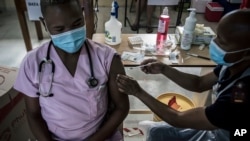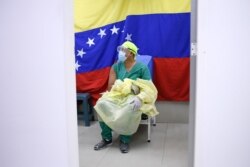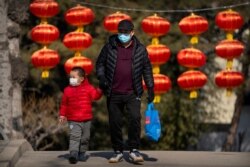The coronavirus death toll on the African continent surpassed 100,000 on Friday, as African countries struggled to obtain vaccines to counteract the pandemic.
South Africa alone accounts for nearly half of the confirmed deaths in Africa with 48,859, according to data from the Johns Hopkins Coronavirus Resource Center. The country, which is facing its own variant of the virus, also accounts for nearly half the confirmed cases in the region, with more than 1.5 million. Total cases across the African continent are more than 3.8 million.
The 54-nation continent of about 1.3 billion people reached the milestone of 100,000 deaths shortly after marking one year since the first coronavirus case was confirmed on the continent, in Egypt on Feb. 14, 2020.
The actual death toll from the virus in Africa is believed to be higher than the official count as some who died were likely never included in confirmed tallies.
Countries across the continent are only beginning to see the arrival of coronavirus vaccines, months after some wealthier countries are well under way in the process of vaccinating their most vulnerable populations.
United Nations Secretary-General Antonio Guterres said Friday that the global manufacturing capacity of coronavirus vaccines needs to double to meet global demand.
In a virtual address to this year's Munich Security Conference, he called for a global vaccination plan to ensure an equitable vaccine distribution and said the biggest world powers must work together.
Without naming the United States and China, he said, “Our world cannot afford a future where the two largest economies split the globe into two opposing areas in a Great Fracture.”
U.S. President Joe Biden announced Friday the U.S. would soon begin releasing $4 billion it pledged to a global campaign to bolster the distribution of COVID-19 vaccines to poor countries. The funds were approved by Congress in December, but former President Donald Trump had declined to participate in the program.
At his first meeting as president with world leaders at the Munich Security Conference, Biden announced the financial support for COVAX, a coalition tasked with distributing vaccines to low- and middle-income countries.
“Even as we fight to get out of the teeth of this pandemic, a resurgence of Ebola in Africa is a stark reminder that we must simultaneously work to finally finance health security, strengthen global health systems, and create early warning systems to prevent, detect and respond to future biological threats, because they will keep coming,” Biden said at the virtual meeting.
German Chancellor Angela Merkel said the pandemic will not end until the world is vaccinated. In remarks after the video conference of leaders of the G-7 group of large, developed economies, she said Germany and other wealthy countries may need to give some of their own stock of vaccines to developing nations.
French President Emmanuel Macron told the conference that Europe and the United States must quickly send enough COVID-19 vaccine doses to Africa to inoculate the continent's health care workers or risk losing influence to Russia and China.
"If we announce billions today to supply doses in six months, eight months, a year, our friends in Africa will, under justified pressure from their people, buy doses from the Chinese and the Russians," Macron told the conference.
Also Friday, Brazil reported 1,308 additional COVID-19 deaths and 51,050 new confirmed cases of the virus on Friday, according to data released by the Health Ministry.
The South American nation has now recorded more than 243,000 deaths and more than 100 million cases, according to data from Johns Hopkins.
In Russia, officials reported Friday 13,433 new coronavirus cases in the previous 24-hour period and 470 deaths.
Japan’s National Institute of Infectious Diseases said a new COVID-19 variant has emerged at a Tokyo immigration facility.
A day after the Australian state of Victoria lifted its COVID-19 five-day lockdown, three family members tested positive for the coronavirus. Two of the three had quarantined at the Holiday Inn at the Melbourne airport.
Health officials in Spain say they have given a full two-shot course of the coronavirus vaccines to almost all the country’s elderly nursing home residents.
Officials in the United States extended land border closures with Canada and Mexico for another 30 days. The extension is the first announced since President Biden took office in January.
White House officials said Friday that the distribution of the vaccine has been held up in all 50 states by winter storms and power outages. They say the country has a backlog of 6 million vaccine doses, but that the federal government expects to be caught up by next week.
In another development Friday, pharmaceutical partners Pfizer and BioNTech said a new study they conducted indicates their COVID-19 vaccine can remain effective when stored in standard freezers for up to two weeks.
If the finding is approved, it would be a significant development since one of the initial drawbacks of the Pfizer-BioNTech COVID-19 vaccine was that it was required to be stored in ultra-low-temperature freezers not commonly found in standard clinics and pharmacies.
The U.S. Centers for Disease Control and Prevention (CDC) said on Friday that data collected in the first month of vaccinations in the United States have found no concerning new issues with either the Pfizer-BioNTech vaccine or the Moderna vaccine.
It said data collected from the administration of 13.8 million doses of vaccine between Dec. 14, 2020, and Jan. 13, 2021, showed 6,994 reports of adverse events after vaccination, with 90.8% of them classified as nonserious and 9.2% as serious.
There are more than 110 million global cases of COVID-19, the disease caused by the coronavirus, according to Johns Hopkins. The United States tops the list with nearly 28 million infections. India is second with nearly 11 million cases, followed by Brazil with more than 10 million.







